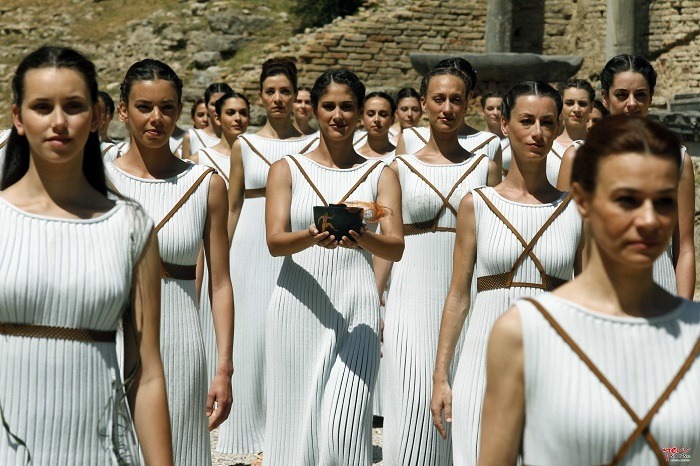The pageantry and the history of the Olympic Games, that ties every generation to every other generation of athletes to have participated in the spectacle, are one of the most important allures of the Olympic movement.
With just over 100 days to go until the opening ceremonies of the 2016 Rio Olympic Games, Thursday, April 21st, will mark the beginning of the Olympic torch relay with the Lighting Ceremony of the Olympic Torch in Olympia, Greece.
As is held by tradition, the flame will be lit by the light of the sun in the Temple of Hera, located where the ancient Olympic Games were held before the modern revival began in 1896. The method of lighting the torch is the same as was used 3000 years ago in the original incarnation of this event.

Courtesy: HOC
2,500 spectators attended Wednesday’s dress rehearsal for the lighting.
Carla Camurati, the culture director of the Rio 2016 Organizing Committee, described Thursday’s festivities thusly:
“It will be an emotional meeting of the cultures of Greece and Brazil. Brazil will present the gods of Greece with an offering of traditional festival music”
After lighting, the torch will go on a 6-day tour of Greece, make a visit to Switzerland, and then embark upon a 90-day journey across Brazil, before it eventually is used to light the Olympic cauldron in the Maracanã Stadium, Brazil’s official Olympic stadium.
Beginning unofficially with the 2010 Winter Olympics, and officially with the 2014 Winter Olympics, the IOC mandated that torch relays only be held within the country hosting the Olympics after the initial Greek leg in response to massive waves of protests marring the relay in the run-up to the 2008 Olympics in Beijing.
Greek gymnast Eleftherios Petrounias, a World Champion on the rings, will be the first to hold the torch. He will pass it on to Giovane Gávio, Brazil’s double Olympic volleyball champion.
The relay will end in a ceremony next Wednesday (27 April) at the Panathinaiko Stadium in the Greek capital, the venue for the historic Athens 1896 Olympic Games. The Olympic torch will be formally handed over to Brazil. Greek popstar Sakis Rouvas will perform at the ceremony.
After leaving Greece, the torch will go to Geneva, Switzerland, for a ceremony at the United Nations. It will then go on display at the nearby Olympic Museum in Lausanne, home of the International Olympic Committee (IOC).
In total, 450 people will carry the torch in the Greek section of the Olympic Torch Relay. One of those will be a so-far unnamed Syrian refugee who has claimed asylum in Greece. At the camp for refugees and migrants in Eleonas, western Athens, the Syrian will bear the torch in the name of all refugees, a continuation of the 2016 Olympics’ outreach effort for inclusion of regufees around the world that includes a designated “refugee team.”

“07/07/2015. Ensaio Estúdio Tocha Olímpica. Sede Rio2016. Sala de Imprensa. Rio de Janeiro.. Brazil.”

We’ve never bettered that Grecian updo hair & pleat look in 2500 years .
Kristian is carrying the torch for a couple seconds, Evan claims to know but I’m not sure.